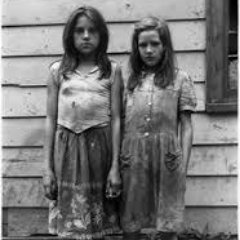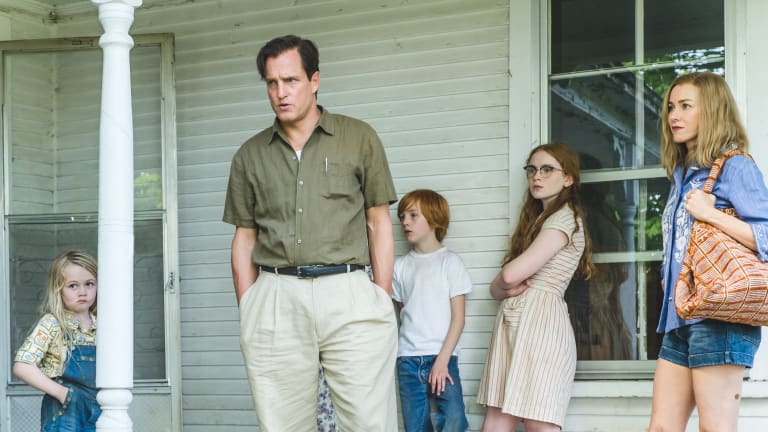
Intuition Marcelo - Rose Mary has more intuition because of her abstract, artistic ability.“As soon as we’d settled into the house, Mom threw herself into her art career.”(Walls 97) Sarah - “”So the trouble you kids got into with Billy Deel was actually a blessing in disguise,”” (Walls 93) This shows how she is idealistic about the situation, like intuitors.
Jeannette Walls was born in Phoenix, Arizona in 1960. As a child, her family moved all over the American Southwest. They had very little money and routinely experienced hunger and homelessness. Jeannette’s mother, Rose Mary Walls, was a passionate painter and ambivalent about cooking meals and cleaning the house. Her father, Rex Walls, suffered from severe alcoholism. For the most part, her parents took a laissez faire approach to parenting, which meant that Jeannette and her siblings—Lori, Brian, and Maureen—were often left to protect and feed themselves. When Jeannette was a teenager, the family moved to Rex’s Appalachian hometown of Welch, West Virginia. There Jeannette started working at the school newspaper, the Maroon Wave, in the seventh grade because it was the only club that didn’t require money to join. This experience launched her lifelong interest in journalism. At 17, Jeannette followed her sister Lori to New York City, where she finished high school and interned at a Brooklyn newspaper called The Phoenix. After graduating high school, she put herself through Barnard College with grants, loans, scholarships, and odd part time work. Jeannette graduated with honors in 1984.
- Rose Mary Walls. The Glass Castle by Jeannette Walls. Summary; Analysis; Characters (13) Essays (20) Quotes (90) All Books (1) Mother to Jeannette and her siblings, and the daughter of Grandma Smith from Phoenix. From childhood, she originally wanted to be an artist, but her mother convinced her to get a teaching certificate.
- Rose Mary Walls (Mom) Center of the Universe. Mom treads the fine line between optimism and delusion. This could be a positive thing, we suppose, but the fact is that Mom spends more time on the delusion side of the fence. She always looks on the bright side of life, but by doing so, she turns life into an absurd Monty Python skit.
After college, Jeannette worked first as a reporter for New York Magazine, and then as a gossip columnist for MSNBC.com, sometimes using tips from her father. During this phase of her career, Jeannette wrote a particularly negative article that targeted the Church of Scientology. The church retaliated by investigating Walls’s parents and threatened to expose her unconventional history. At this point, Jeannette's parents lived as squatters in Manhattan’s Lower East Side, and often appeared on the local news talking about squatters’ rights. Although she remained in close contact with her parents, Jeannette worried she would lose her job and connections if people knew the truth about her past. She had hoped to keep the details of her life a secret. However, her husband, John, thought her life would make a great book. He encouraged her to tell her story on her own terms rather than risk cruel exposure, and this became the impetus for writing The Glass Castle.

Although Rex’s reckless behavior caused most of the Walls family’s upheaval, the exploitative business practices of the mining companies Rex found work with exacerbated their financial troubles. Throughout the early to mid-twentieth century, mining companies would build camps—also known as company towns—to provide the amenities that miners and their families needed to survive. Because the companies owned every establishment in the area, they controlled both the miners’ wages and their cost of living. Companies often abused this arrangement, adjusting prices and wages to drive miners into debt, and essentially making them indentured servants. The remote nature of many of these camps meant that miners had no access to other stores or the freedom to seek other jobs. For many industries, the practice of creating company towns had largely fallen out of favor by the 1930s thanks to President Franklin D. Roosevelt’s New Deal. However, many of the mining communities the Walls family lived in or around still operated in a similar way.
The Walls family arrived in Welch in the early 1970s, a time of heightened racial tensions in the United States. During the Civil Rights Movement of the 1950s and 60s, black activists engaged in public protest and civil disobedience to demand that the federal government uphold their civil rights and bring an end to racially segregated public spaces. White resentment grew as black Americans gained the constitutional and legal rights that white Americans had long enjoyed. In more impoverished communities like Welch, this resentment often manifested as blame. On April 4, 1968, in Memphis, Tennessee, a white man named James Earl Ray assassinated Martin Luther King Jr. King’s assassination led many black activists to feel that white America considered even nonviolent action too threatening. Throughout The Glass Castle, Jeannette encounters both suspicion from black neighbors and the horrific vitriolic racism of white neighbors.

Walls published The Glass Castle in 2005 to much critical and popular acclaim. The book remained on TheNew York Times Best Seller list for years, and in 2017 was made into a movie, starring Brie Larson as Jeannette. Walls has since published two more full-length books, Half-Broke Horses and Silver Star. Walls lives with her husband John on a 205-acre farm in Virginia. Rose Mary lives in a cottage on Jeannette’s farm, where she still paints and collects art. Despite her father’s reckless alcoholism, Jeannette cherishes the relationship she had with him. Compared to her mother and siblings, Jeannette was the most enthusiastic advocate of her father’s wild antics and extravagant aspirations, extending him grace and compassion when the rest of the family couldn’t. To this day, Walls credits her self-confidence to their special bond, saying he instilled in her the courage, gratitude, and intelligence she needed to be happy in life. She doesn’t see herself as a victim of child abuse, but rather an exemplary product of alternative parenting.
Jeannette Walls Rose Mary Walls Children
- 1
Discuss the role of fire in the novel.
After Jeannette is burned the first time fire continues to appear in the work. It burns down a number of houses and harms some of the characters. Jeannette believes that the fires might all be connected. Jeannette describes fire as a sort of character itself.
- 2
How does Jeannette characterize her parents? What is her tone towards them and their actions?
Jeannette describes her parents' faults and shortcomings but she does not condemn them for their actions. Indeed, by the novel’s end she appears to have come to an understanding about their way of living. The goal of the work is not to insult or vilify her parents but, in a way, to honor them.
- 3
Why does Jeannette choose to title the book The Glass Castle even though the structure is never built?
The glass castle characterizes Rex Walls’ need to create a life of fantasy and adventure for his family in the absence of stability and practicality. Its construction is consistently delayed in the work, but that which it represents endures. Jeannette’s memoir is, in part, an erection of this fabled structure. In writing, she takes one step towards fulfilling her father’s promise.
- 4
Explain the role of nature and the attitudes taken toward it in the memoir?
Without the amenities of modern life, the Walls family is frequently in awe of the beauty of nature. Especially while living in the Midwest, nature becomes a sort of home for the Walls. Rose Mary Walls also instills within her children an appreciation for animals and nature by refusing to kill or harm it with modern technology.
- 5
What about Jeannette’s experience is atypical of general ideas about American poverty? Why do you think Jeannette includes these examples?
For much of the work, Jeannette and her family live in conditions characteristic of poverty. However, Jeannette’s experience also includes rigorous homeschooling from her parents and exposure to classic literature. Despite her conditions, she and her siblings are often placed in the gifted classes in school. In showing that her parents, though poor, were not unintelligent, Jeannette proposes an often undetailed view of America’s impoverished.
- 6
Discuss the role of setting in the novel? How does the theme of the work change when the setting changes?
Setting is clearly an important part of the work. Indeed, two sections of the novel are named after a particular environment. In addition, there is a clear shift in tone and plot when the Walls move from the desert to Welch, Virginia. Setting not only affects how the family must live but it also influences their hope for escaping poverty.
- 7
Compare Jeannette’s relationship with Brian and Lori to that between her and Maureen. Why are there differences?
Jeannette and her siblings depend on each other for survival. Jeannette and Brian pair together when faced by bullies from outside. Although Lori and Brian differ from Jeannette in their early loss of hope in Rex. Maureen exists as a sort of “black sheep” in the family. Not only does she not have red hair, but she seldom spends time with the family and instead relies on others to care for her. For this reason, Jeannette considers Maureen in need of more protection than the rest of her siblings.
- 8
Describe the structure of the memoir. Why does Walls decide to frame her story with her adulthood before reflecting on her childhood?
Jeannette begins her story by describing her motivation for writing it. Her mother’s urgings that she not hide from her past anymore prompt Jeannette to begin telling her story. Because shame once inhibited her from sharing her story, she begins by describing that which gave her the courage to write it down.
- 9
Ppf o matic v3 0 download. Discuss Rose Mary Walls' role as a mother.
Rose Mary Walls commonly seems focused on her aims alone. She loses or quits jobs in order to pursue her profitless career as an artist even at times when her family needs her salary for basic necessities. At times, Rose Mary behaves more like a child than her children, throwing tantrums, refusing to go to work, and creating excuses.
- 10
Rex Walls frequently makes up fantastical stories to create a life of excitement out of his circumstances. Is this deceitful? In what ways can these stories be seen as an attempt to shield the family from the truth?
Rex Walls tends to create fantastical explanations to keep his children from considering themselves lesser than others because of their lack of money. When the children are young, this seems harmless. He gives them stars for Christmas instead of gifts and makes life an adventure by telling them they are being chased. However, as the children grow older, Rex’s stories are used as a means to protect or excuse his behavior instead of as a means to shield his children from the reality of their condition.

